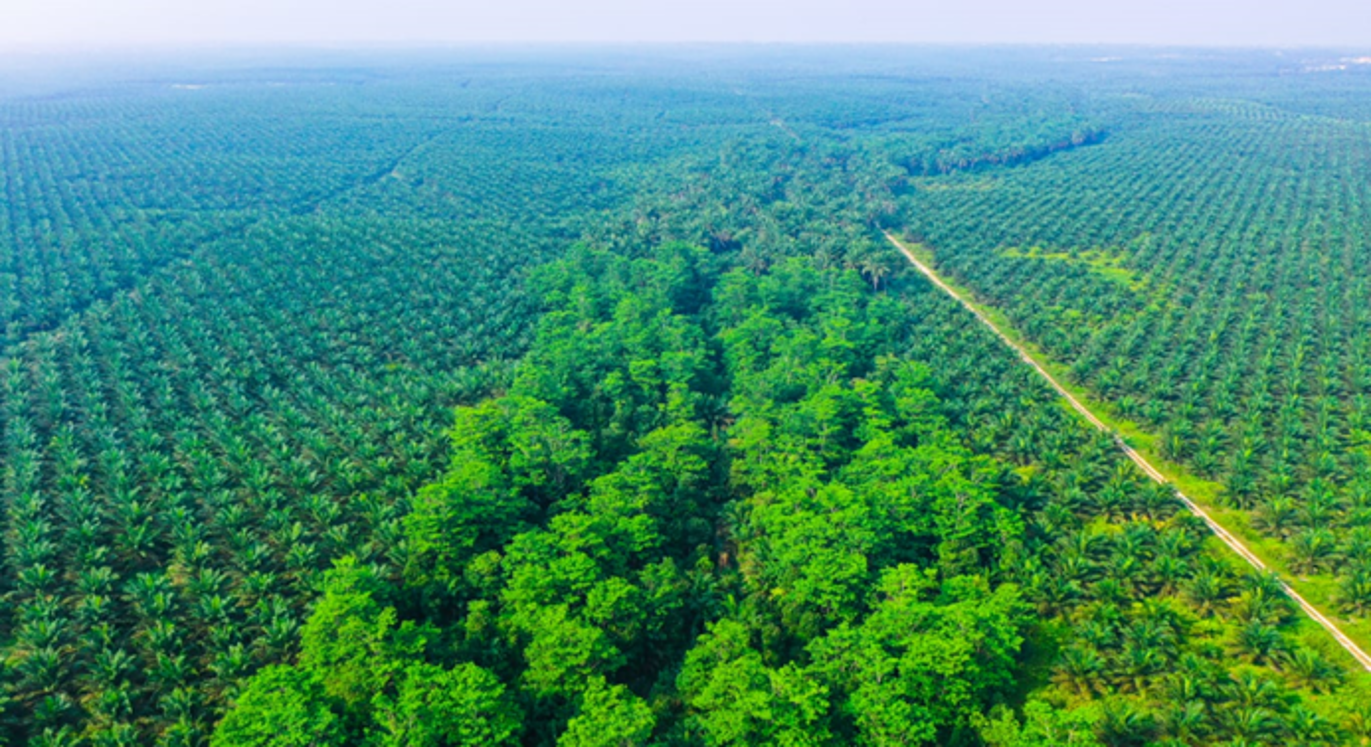
Image: image of one of the RERTA experimental rivers from the air, showing active and passive restoration treatments. Photo by Agung Aryawan
The impacts of riparian within oil palm insect movement and behaviour
Supervisor: Prof Edgar Turner
Oil palm is now the number one source of vegetable oil worldwide, covering an area of nearly 30 million hectares globally, with Indonesia and Malaysia being the major producers. In both countries, there is established guidance (through Roundtable on Sustainable Palm Oil, Malaysian Sustainable Palm Oil, and Indonesian Sustainable Palm Oil certification) to either maintain or restore riparian vegetation along river margins, but there has so far only been limited studies assessing the effectiveness of alternative restoration treatments. Based within a long-term and large-scale restoration experiment, the Riparian Ecosystem Restoration in Tropical Agriculture Project (RERTA) in Riau, Indonesia, this project will assess the impacts of alternative river-margin restoration strategies on insect movement and behaviour in the field. This will include assessing insect movement within and out of restored areas through mark release recapture techniques and directional traps for some key groups of insects, such as assassin bugs, which support ecosystem services such as pest control. The project will also assess fine-scale choice of location across restoration treatments, as well as use of resources by other insect groups, such as ants and dung beetles, using bespoke camera traps and direct observations. The project will benefit from a close collaboration with researchers from IPB University, Bogor, and researchers at Sinar Mas Agro Resources and Technology Research Institute, who manage the RERTA Project.
Type of work
The student will collect data on insect movement within established river margin restoration experiment sites in oil palm plantations in Riau, Indonesia. This includes three different restoration options on replicated rivers (including active replanting with a mix of six native tree species, and leaving mature oil palm during replanting to restore passively), as a well as a control treatment (young oil palm replanted to the river edge). Field work will be carried out in collaboration with researchers from Sinar Mas Agro Resources and Technology Research Institute, giving the student access to information and expertise on oil palm management, and a valuable direct link to the oil palm industry, facilitating translation of results into management practice.
Importance of the area of research concerned
The student will collect data on insect movement within established river margin restoration experiment sites in oil palm plantations in Riau, Indonesia. This includes three different restoration options on replicated rivers (including active replanting with a mix of six native tree species, and leaving mature oil palm during replanting to restore passively), as a well as a control treatment (young oil palm replanted to the river edge). Field work will be carried out in collaboration with researchers from Sinar Mas Agro Resources and Technology Research Institute, giving the student access to information and expertise on oil palm management, and a valuable direct link to the oil palm industry, facilitating translation of results into management practice.
References
Luke SH, Foster WA, Advento AD, Aryawan AAK, Adhy DN, Ashton-Butt A, Barclay H, Drewer J, Dumbrell A, Eycott AE, Harianja MF, Hinsch JA, Hood ASC, Kurniawan C, Kurz DJ, Mann DJ, Matthews Nicholass KJ, Naim M, Pashkevich MD, Prescott GW, Sudharto Ps, Pujianto, Purnomo D, Purwoko RR,Putra S, Rambe TDS, Slade EM, Soeprapto, Spear DM, Suhardi, Tan D, Tao1 H-H, Tarigan RS, Wahyuningsih R, Waters HS, Widodo RH, WoodhamCR, Caliman J-P, Snaddon JL, Turner EC (2020) The Biodiversity and Ecosystem Function in Tropical Agriculture (BEFTA) Programme: using large-scale experiments to test and develop more-sustainable oil palm management. Frontiers in Forests and Global Change. 2:75. doi: 10.3389/ffgc.2019.00075 Stone J, Advento A Pashkevich M, Aryawan AA, Caliman J-P, Hood A, Foster W, Naim M, Pujianto, Purnomo D, Suhardi, Tarigan RS, Rambe, Tuani DS, Widodo RH, Luke S, Snaddon J& Turner EC (2023). Maintaining understory vegetation in oil palm plantations supports higher assassin bug numbers (Ecological solutions and evidence http://dx.doi.org/10.1002/2688-8319.12293).
